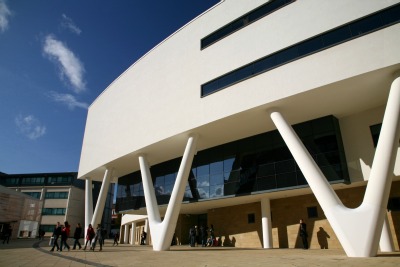So do we go for excellence in teaching or in research? Both, obviously. They’re fully compatible. In fact, they feed off each other.
Undergrads and postgrads are stimulated by an active research environment. To a large extent the whole point of university study is that you are now being taught by the people who have written the books and articles and made breakthroughs in the lab.
Meanwhile, researchers who are also active and dedicated lecturers or postgraduate supervisors will often say that they are energised by their students – even learn from them on occasions!
Also, the combination of great teaching and research excellence is the catalyst which enables a university like Huddersfield to play its full part in economic regeneration. For a start, we produce the skilled graduates that business needs and wants. Our figures for graduate employability or further study after six months are consistently excellent – the latest Destination of Leavers in Higher Education (DLHE) figure is 94.9 per cent and HESA’s statistics have placed us at sixth in the entire UK sector.
“The combination of great teaching and research excellence is the catalyst which enables a university like Huddersfield to play its full part in economic regeneration.”
At the same time, we engage directly with business on research that solves problems or opens up new possibilities.
Knowledge Transfer Partnerships, or KTPs, are partnerships formed between businesses and universities, allowing companies to access universities’ specialist expertise to solve specific strategic problems. They are perhaps the most streamlined and direct form of business engagement. We have some very interesting projects on the go at Huddersfield with ambitious local and regional firms and with some multi-national players. And the roster of companies associated with our EPSRC Centre for Innovative Manufacturing in Advanced Metrology looks rather like a FTSE 100 listing.
When you add our relationship with the 3M Corporation – which has backed our new Business and Innovation Centre and bestowed on Huddersfield the only 3M professorial chair outside of Harvard – then it is obvious that research excellence backed by ambition can transform an institution like the University of Huddersfield into a global player.
It certainly means that a Vice-Chancellor and his colleagues become globe trotters. And we never miss a chance to sell our university. On a recent internal flight in the USA I found myself seated next to a young man from Minnesota who wanted to study for a chemistry degree. I told him what we had to offer – and he has now relocated to the UK and is in his first year at Huddersfield.
“I am deeply committed to a business-facing agenda for my university. That’s why I am delighted that Huddersfield is the THE’s Entrepreneurial University of the Year.”
As a good UA member, I am deeply committed to a business-facing agenda for my university. That’s why I am delighted that Huddersfield is the THE’s Entrepreneurial University of the Year. Between now and December I will waste no opportunity to trumpet this achievement, believe me!
We are making strenuous efforts to raise our research profile at Huddersfield and over the past five years our research income has doubled. Needless to say, the 2014 REF is concentrating our minds wonderfully. It’s not just a question of extra income and kudos. If a university wants to fulfil its key role as an agency for economic regeneration, it must demonstrate research excellence in order to build collaborations with industry.
But as I reflected at the start of this blog, the teaching side is also vital to the equation and we have taken some highly innovative steps at Huddersfield in order to ensure that all of our students, all of the time are taught by fully-professional, fully-accredited lecturers. The possession of a postgraduate degree – preferably a doctorate – is vital, but in itself it is no guarantee that its holder will be a good teacher. That is a statement which might seem blindingly obvious, but I think that there has been some self-delusion in the HE sector on this issue.
“If a university wants to fulfil its key role as an agency for economic regeneration, it must demonstrate research excellence in order to build collaborations with industry.”
That is why I decided that we would aim to have every member of our lecturing staff become fully accredited with the Higher Education Academy. Towards the end of last year we made it. All 750 of our lecturers who have a substantive teaching role are now Fellows of the HEA and Huddersfield is the first UK university – although I hope not the last – where this is the case.
The process of seeking HEA accreditation is no simple exercise in form filling and rubber stamping. Applicants must produce a portfolio of work which demonstrates their commitment to and understanding of good teaching. The very process of producing an application helps to concentrate the mind and leads to a deeper understanding of the teaching process.
So, as we prepare for the run up to the REF, and the next student recruitment cycle, I am confident that we are in the best possible position – and ready to meet the next challenge head on.




